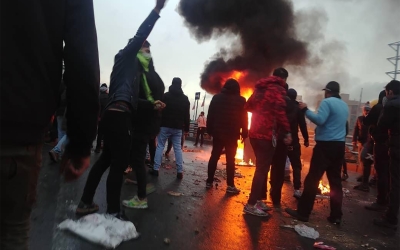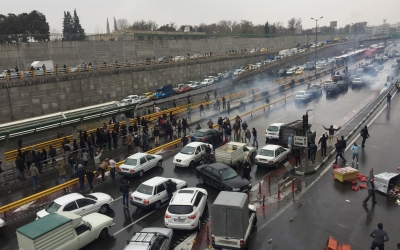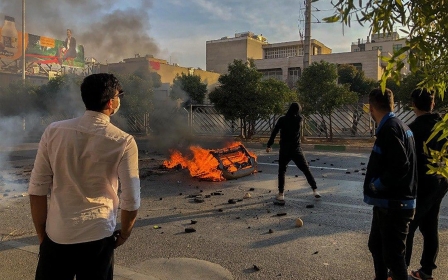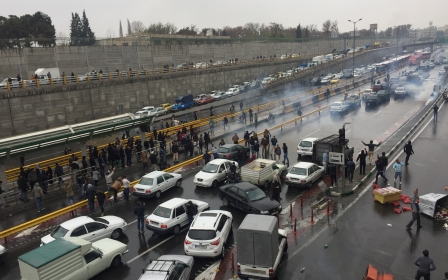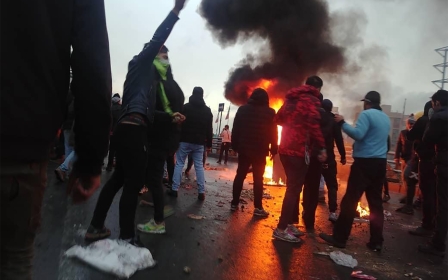Iranian president calls petrol protests 'enemy conspiracy'
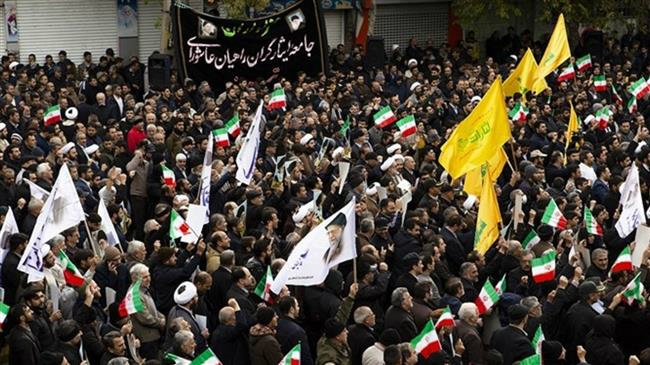
Iranian President Hassan Rouhani said on Wednesday that the country had defeated an "enemy's conspiracy" after more than 100 protesters were reportedly killed during nationwide protests against a petrol price hike.
"Our people have been victorious against... the enemy's conspiracy," Rouhani said in remarks at a meeting of his cabinet aired on state television.
Thousands of Iranians joined pro-government rallies in several cities on Wednesday, state media said, after Amnesty International said more than 100 protesters had died in the recent unrest.
State television showed pro-government rallies in Rasht, Gorgan and Ardabil in the north; Hamadan in the west; and Shahryar, south of the capital Tehran, where a member of the security forces was also killed in the turmoil.
Rouhani described the protesters as a few "organised, armed anarchists" who took to the streets "based on a plot that the region's reactionary, the Zionists and Americans had hatched", he said, referring to Saudi Arabia, Israel and the United States.
"The Iranian people have again succeeded in a historic test and shown they will not let enemies benefit from the situation, even though they might have complaints about the country's management," Rouhani said.
"The nation of Iran has shown the world its vigilance, awareness, unity and solidarity with the entire system" of the Islamic republic, he added.
State media carried pictures of Ali Shamkhani, secretary of Iran's top security body, marching in Shahryar behind a banner that read, "Death to America and Israel's deception!" Reuters news agency reported.
Dual nationals arrested
The unrest began on Friday after gasoline prices were raised at least 50 percent and rationing was imposed.
Iran has blamed "thugs" linked to exiles and foreign enemies for the protests which quickly turned political.
On Wednesday, the semi-official Fars news agency reported that Iranian dual nationals were among those arrested since last week.
Citing security sources, Fars reported that detained German, Turkish and Afghan dual nationals had been trained and funded by foreign services to carry out operations for destroying infrastructure and stirring up civil disobedience.
Supreme Leader Ayatollah Ali Khamenei said on Tuesday that the protests had been a security matter, not a popular movement, and had been dealt with successfully.
Government spokesman Ali Rabiei said a plot to bomb Iran's major gas production installations in Assalouyeh on the Gulf had been thwarted, blaming it on protesters, the semi-official news agency Mehr reported.
Iran rejects reports of scores killed
Amnesty International said at least 106 protesters in 21 cities had been killed, according to witness reports, verified videos and information from human rights activists.
Iran's mission to the United Nations called Amnesty's report "baseless allegations and fabricated figures".
Iran has restricted access to the internet, making it nearly impossible for protesters to post social media videos of demonstrations.
About 1,000 protesters have been arrested, officials said.
The UN human rights office said it had received reports that dozens of people had been killed. It urged authorities to rein in its use of force to disperse protests.
Frustration has grown over a weakening currency and rising prices for bread, rice and other staples since the US withdrew from Iran's 2015 nuclear agreement and re-imposed sanctions.
The government said the price rises were intended to raise around $2.55bn a year for extra subsidies to 18 million families struggling on low incomes.
Middle East Eye delivers independent and unrivalled coverage and analysis of the Middle East, North Africa and beyond. To learn more about republishing this content and the associated fees, please fill out this form. More about MEE can be found here.


